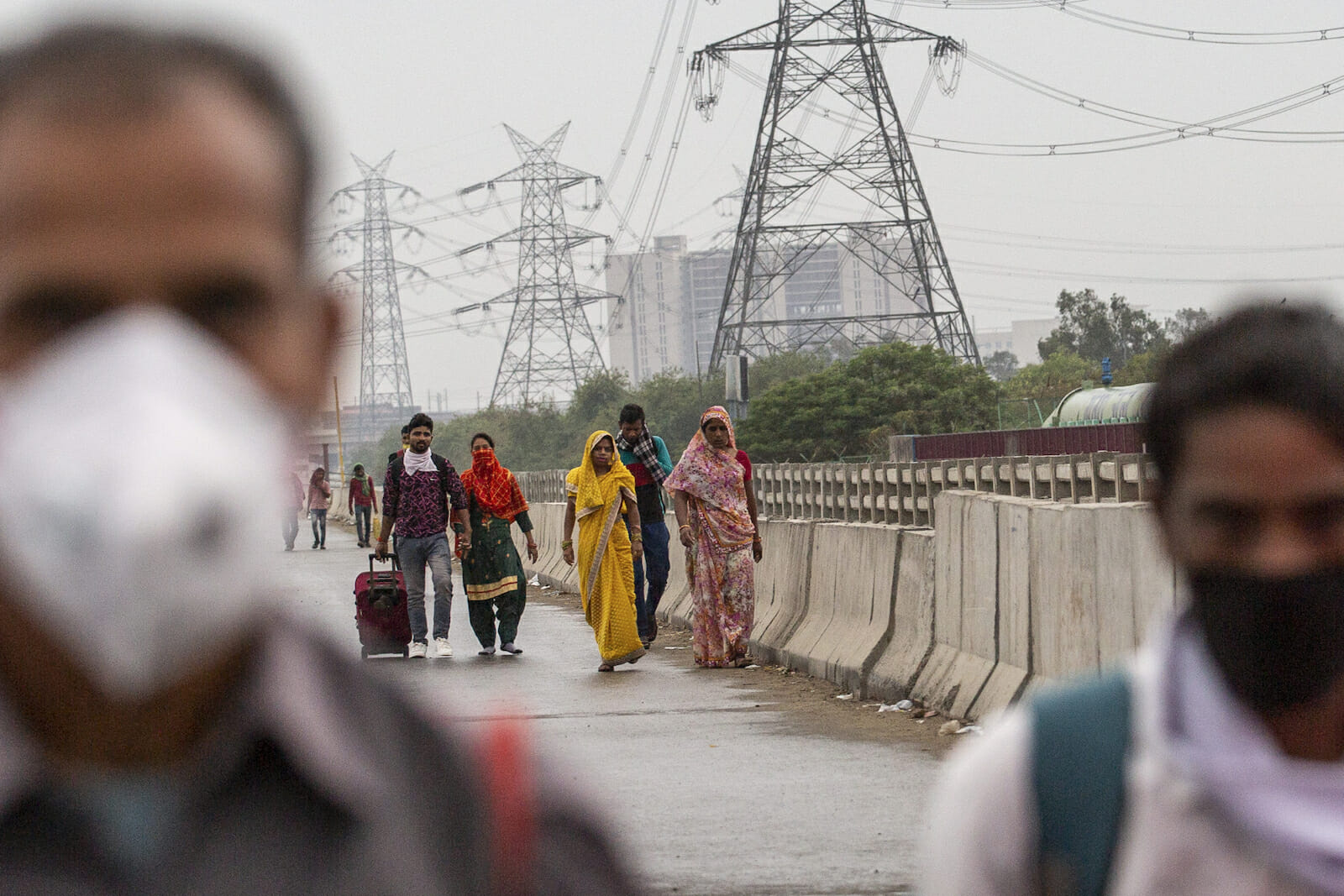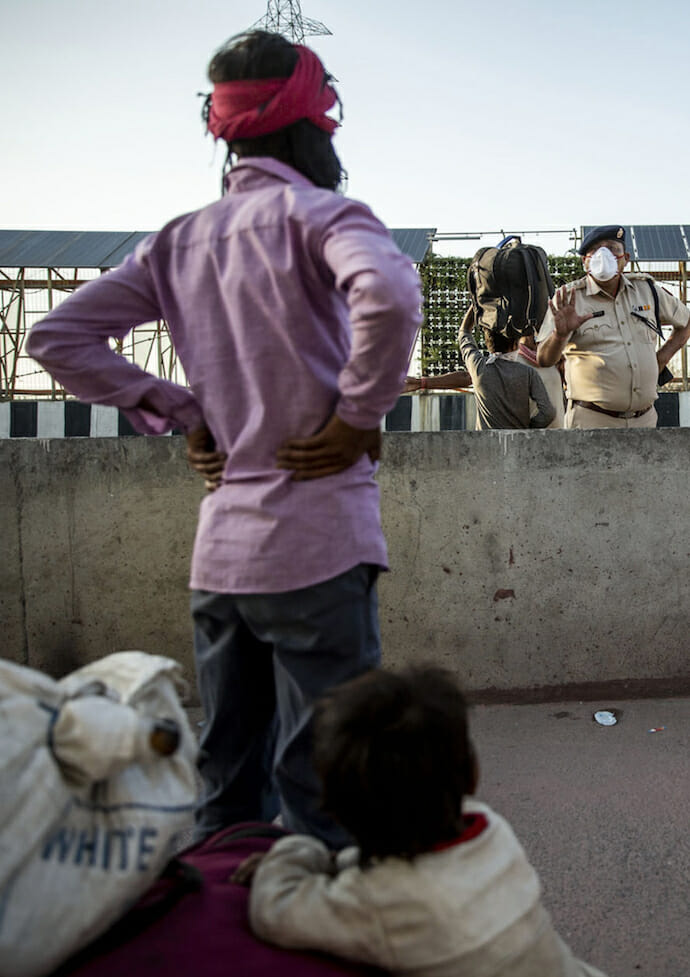
No Country for Poor Men and Women: COVID-19 and India’s Poor Labourers
The priorities of any government can be easily ascertained by its policies and reactions in times of crisis. The unfortunate priorities of the Indian government can be understood when one takes a look at its actions in response to the situation of poor migrant workers in the wake of the COVID-19 lockdown. It seems that this section of society is invisible to the Modi government. The nature of these poor labourers is informal. They receive daily wages and have no job security. It is almost as if the presence of this section of society, which toils very hard every day, is only felt when the country suffers a huge shock like the demonetization scheme of the government. Needless to say, they are the worst-hit and have no political voice which can be heard.
Ever since the lockdown was imposed by the Modi government, migrant workers have faced insurmountable challenges. Alarming images and reports of migrant workers and their families have surfaced where they can be seen walking or cycling back to their home states, sometimes spanning hundreds of miles. There have been several instances where family members of migrant workers have died from fatigue and exhaustion or have been hit by speeding cars. Reasonable people have asked why this mass exodus even came into the picture. Why couldn’t migrant workers stay where they were? The answer lies in the insensitivity of their employers, landlords, and the Modi government. Employers not giving them their incomes, landlords pestering them for rents, and the government’s lack of concern.
So, instead of being stranded and dying of poverty and hunger in a land which is not their own, migrant labourers decided that they had to return home where they faced an equal amount of uncertainty. Even though the central government has arranged for special ‘Shramik trains’ for the poor to return to their homeland, the inadequacies of this arrangement are countless. The government is making the poor pay for train tickets, disregarding the financial problems and the abject poverty which they have been driven to because of this lockdown. If this isn’t sheer apathy, one cannot tell what is. There are also the hassles of inaccessible forms and paperwork and other formalities which they have to deal with.
They are being made to fill out forms in inaccessible languages and arrange for a medical certificate for themselves and their family members at a time when medical professionals are busy attending to COVID-19 patients. Walking hundreds of miles home seems more feasible to the poor of India than solutions of such kind. Some Indian state governments claim that they will foot the bills of the poor for their train tickets. But the recent events and the track record of the government’s consistent disregard against the poor gives rise to a feeling of pessimism.

Moreover, the indifference of some state governments to the conditions of migrant labourers is disgraceful. Recently, the state of Karnataka canceled the special trains in order to curtail the ‘unnecessary movement’ of the migrant workers. This decision was taken right after the chief minister of the state met with prominent builders of the state, who expressed their concerns about construction activities being stopped in their totality and the possibility of migrant labourers not returning from their homelands as soon as the lockdown ends. This clearly alludes to the influence of ‘powerful’ people in the industry and compels one to think about the effect of these capitalists on governmental decisions.
Are the migrant labourers not human enough to be attended to and given assistance to lead a less problematic life? Are they just tools to achieve economic goals with no needs and lives of their own? Besides, labeling the movement of the migrant workers to get back to their loved ones as ‘unnecessary’ is deplorable. What about affluent Indians living in other countries for whom the government is working so magnanimously and swiftly to get them back to India, their homeland? Is their movement necessary or unnecessary? Such disregard for the poor is appalling and heart-wrenching. Yes, it is imperative that the economy is revived, but that is not an excuse for forcing the labour force to provide their services whatsoever. Although this step of the Karnataka government has been withdrawn due to the criticisms it received, the very fact that this step was even taken speaks a lot in terms of the inhumanity meted out against the poor.
If this wasn’t enough, the opportunist state government of Uttar Pradesh scrapped most of the labour laws concerning occupational safety, health, hours of work, wages, and dispute settlement of the working class for the next three years. This has been done in order to create employment opportunities for attracting factories and companies opting to exit China after the outbreak of COVID-19. Scrapping labour rights during a global pandemic and blessing factory owners and companies with the rights of unlimited exploitation of their workforce is definitely not what the labour force of India needed at this point. States like Madhya Pradesh and Gujarat have quickly followed suit in the pretext of generating employment. Such a step of the government will not create more employment opportunities but will just aid in the deterioration of the already lamentable state of the labour force of India. If it can’t create more rights, the government shouldn’t take away rights which the labour force has achieved after so many years of struggle.
It is ironic that migrants have to encounter such difficulties during the month of International Labour Day. Is this country not a country for poor people? Is it a country only for the rich and the middle class? What is the reason behind such a delayed awakening that the migrant labourers belong to the population too? Why weren’t provisions for safe and effortless movement of the migrant population made as soon as the lockdown was announced? The already existing, deeply entrenched economic and social inequalities are abominable and require strict policy interventions and constant attentiveness to improve the situation. The Modi government should strive to provide social and job security to these people, for that is the bare minimum it can do for them. Besides, it shouldn’t take a pandemic for a government to realize that the migrant labour force is a part of the nation’s population and that it has the right to life and livelihood and requires the government’s assistance too.

